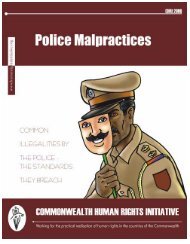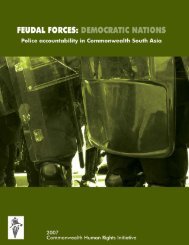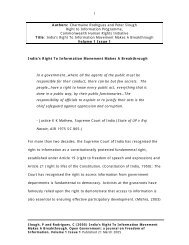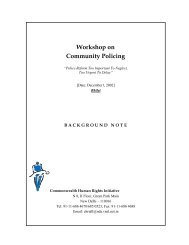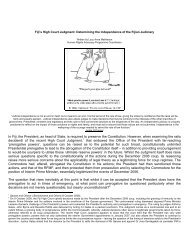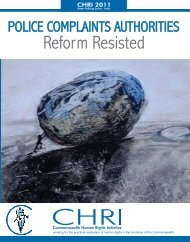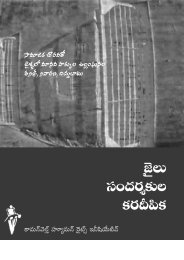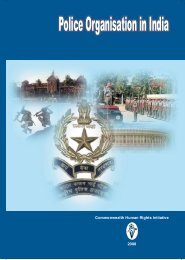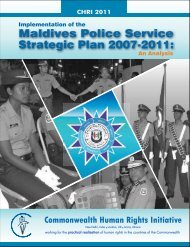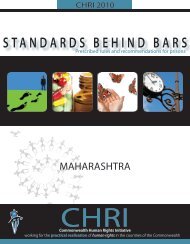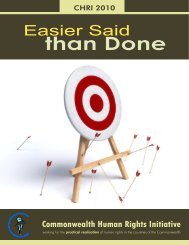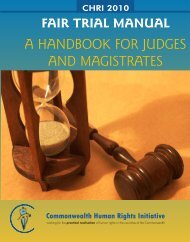A Critique of the National Commission for Human Rights Bill, 2005
A Critique of the National Commission for Human Rights Bill, 2005
A Critique of the National Commission for Human Rights Bill, 2005
You also want an ePaper? Increase the reach of your titles
YUMPU automatically turns print PDFs into web optimized ePapers that Google loves.
A <strong>Critique</strong> <strong>of</strong> <strong>the</strong> <strong>National</strong> <strong>Commission</strong> <strong>for</strong> <strong>Human</strong> <strong>Rights</strong> <strong>Bill</strong>, <strong>2005</strong><br />
By Mandeep S. Tiwana, Commonwealth <strong>Human</strong> <strong>Rights</strong> Initiative, June <strong>2005</strong><br />
With <strong>the</strong> passing <strong>of</strong> <strong>the</strong> <strong>National</strong> <strong>Commission</strong> <strong>for</strong> <strong>Human</strong> <strong>Rights</strong> <strong>Bill</strong>, <strong>2005</strong>, Pakistan will<br />
join a growing list <strong>of</strong> countries to have <strong>National</strong> <strong>Human</strong> <strong>Rights</strong> Institutions (NHRIs). It is<br />
encouraging that <strong>the</strong> government, in drafting <strong>the</strong> <strong>Bill</strong>, has taken <strong>the</strong> first step to realise <strong>the</strong><br />
“better protection and promotion <strong>of</strong> human rights” <strong>for</strong> <strong>the</strong> people <strong>of</strong> Pakistan. The test <strong>of</strong><br />
its commitment to fulfilling this objective - through an effective <strong>National</strong> <strong>Commission</strong> <strong>for</strong><br />
<strong>Human</strong> <strong>Rights</strong> – lies in attuning <strong>the</strong> <strong>Bill</strong> with international standards. NHRIs are expected<br />
to hold fast to <strong>the</strong> Paris Principles, a set <strong>of</strong> internationally recognised minimum<br />
requirements to guide <strong>the</strong>ir establishment. They have been endorsed by <strong>the</strong> United<br />
Nations 1 and were developed after extensive consultations between representatives <strong>of</strong><br />
NHRIs; governments; <strong>the</strong> United Nations; and inter-governmental and non-governmental<br />
organisations from across <strong>the</strong> world. The Paris Principles require an NHRI to<br />
demonstrate <strong>the</strong> following:<br />
Competence to promote and protect human rights<br />
Competence is determined in large measure by <strong>the</strong> definition <strong>of</strong> human rights in <strong>the</strong> Act<br />
governing <strong>the</strong> NHRI. Any <strong>of</strong>ficial definition <strong>of</strong> human rights in Pakistan will be<br />
truncated, as none <strong>of</strong> <strong>the</strong> successive governments have ratified <strong>the</strong> International Covenant<br />
on Civil and Political <strong>Rights</strong> (ICCPR) or <strong>the</strong> International Covenant on Economic, Social<br />
and Cultural <strong>Rights</strong> (ICESCR) or <strong>the</strong> Convention Against Torture and O<strong>the</strong>r, Cruel,<br />
Inhuman or Degrading Treatment or Punishment (CAT) or <strong>the</strong> International Convention<br />
on <strong>the</strong> Protection <strong>of</strong> <strong>the</strong> <strong>Rights</strong> <strong>of</strong> All Migrant Workers and Members <strong>of</strong> <strong>the</strong>ir Families<br />
(ICRMW). 2 Consequentially, <strong>the</strong> <strong>Bill</strong> contains a relatively narrow definition <strong>of</strong> human<br />
rights, which consists <strong>of</strong> <strong>the</strong> rights relating to life, liberty, equality and dignity guaranteed<br />
in <strong>the</strong> constitution, or embodied in <strong>the</strong> select few international instruments on human<br />
rights ratified by Pakistan and en<strong>for</strong>ceable by its courts. Clearly, a restricted definition<br />
will serve only to limit <strong>the</strong> commission’s mandate. On <strong>the</strong> o<strong>the</strong>r hand, Fiji’s <strong>Human</strong><br />
<strong>Rights</strong> <strong>Commission</strong> Act provides a good example <strong>of</strong> a broad and inclusive definition.<br />
This law streng<strong>the</strong>ns its commission by defining human rights as “rights embodied in <strong>the</strong><br />
United Nations Covenants and Conventions on <strong>Human</strong> <strong>Rights</strong> and includes <strong>the</strong> rights and<br />
freedoms set out in <strong>the</strong> <strong>Bill</strong> <strong>of</strong> <strong>Rights</strong>”.<br />
1 Paris Principles have been endorsed by <strong>the</strong> United Nations <strong>Commission</strong> on <strong>Human</strong> <strong>Rights</strong> in 1992<br />
(resolution 1992/54) and by <strong>the</strong> General Assembly <strong>of</strong> <strong>the</strong> United Nations in 1993 (resolution 48/134).<br />
2 Of <strong>the</strong> seven core international human rights instruments, Pakistan has ratified only three: International<br />
Convention on <strong>the</strong> Elimination <strong>of</strong> All Forms <strong>of</strong> Racial Discrimination (ICERD);Convention on <strong>the</strong><br />
Elimination <strong>of</strong> All Forms <strong>of</strong> Discrimination against Women (CEDAW) – with reservation; and Convention<br />
on <strong>the</strong> <strong>Rights</strong> <strong>of</strong> <strong>the</strong> Child.
Inadequate powers also constrain <strong>the</strong> competence <strong>of</strong> <strong>the</strong> commission. The <strong>Bill</strong> vests <strong>the</strong><br />
commission with <strong>the</strong> powers <strong>of</strong> a civil court to conduct inquiries but it does not confer <strong>the</strong><br />
same breadth <strong>of</strong> powers to <strong>the</strong> commission <strong>for</strong> <strong>the</strong> effective exercise <strong>of</strong> its o<strong>the</strong>r<br />
functions. For instance, if <strong>the</strong> commission is denied in<strong>for</strong>mation by a government<br />
department, which will help in <strong>the</strong> spread <strong>of</strong> human rights literacy, <strong>the</strong> <strong>Bill</strong> lacks teeth to<br />
en<strong>for</strong>ce this function. By contrast, South Africa’s <strong>Human</strong> <strong>Rights</strong> <strong>Commission</strong> Act obliges<br />
state organs to provide assistance as may be reasonably required to aid its commission<br />
and even prescribes punishment - with fine or imprisonment up to six months - <strong>for</strong> failure<br />
to do so.<br />
An appointment process that guarantees <strong>the</strong> representation <strong>of</strong> civil society<br />
Appointments under <strong>the</strong> <strong>Bill</strong> are entirely controlled by <strong>the</strong> government, leaving no scope<br />
<strong>for</strong> public participation. Members are to be appointed by <strong>the</strong> President who may seek<br />
nominations from <strong>the</strong> Federal Government. The input <strong>of</strong> civil society, which is at <strong>the</strong><br />
<strong>for</strong>efront <strong>of</strong> human rights protection and promotion, and <strong>of</strong>ten best placed to comment on<br />
human rights matters, is excluded. Malawi provides a good example <strong>of</strong> civil society<br />
involvement in appointments. The government is obliged under <strong>the</strong> constitution to invite<br />
credible civil society groups, who are representative <strong>of</strong> Malawian society and concerned<br />
with <strong>the</strong> promotion <strong>of</strong> constitutional freedoms, to nominate suitable persons as members<br />
<strong>of</strong> <strong>the</strong> human rights commission.<br />
Guarantees <strong>of</strong> independence and pluralism<br />
Perhaps <strong>the</strong> <strong>Bill</strong>’s greatest flaw is that it expects <strong>the</strong> commission to pursue or defend<br />
complaints, and make representations <strong>for</strong> and against Pakistan, in consultation with <strong>the</strong><br />
Federal Government’s Foreign Affairs Division be<strong>for</strong>e “any international organisation<br />
and <strong>for</strong>eign government or non-governmental organisation”. Such a provision, if<br />
legislated, will seriously impair <strong>the</strong> commission’s autonomy, and make it subservient to<br />
<strong>the</strong> government’s <strong>for</strong>eign policy.<br />
It is heartening that <strong>the</strong> <strong>Bill</strong> provides <strong>for</strong> <strong>the</strong> appointment <strong>of</strong> two members from<br />
minorities; at least two women members; and a member from each province and <strong>the</strong> two<br />
federally administered territories, who are required to have “knowledge, experience and<br />
background <strong>of</strong> <strong>Human</strong> <strong>Rights</strong>”. However, any influence <strong>the</strong>se members may have in<br />
determining <strong>the</strong> thrust <strong>of</strong> <strong>the</strong> commission could be counterbalanced by <strong>the</strong> appointment <strong>of</strong><br />
Members <strong>of</strong> Parliament and <strong>for</strong>mer judges or <strong>for</strong>mer senior government servants or<br />
persons qualified to be judges who do not have to demonstrate any commitment,<br />
experience or knowledge <strong>of</strong> human rights. The ability <strong>of</strong> Members <strong>of</strong> Parliament to<br />
properly discharge <strong>the</strong>ir functions as commissioners - including inquiry into complaints –<br />
throws up serious doubts, given <strong>the</strong>ir political affiliation, duties in Parliament and<br />
obligations to political parties and constituencies. In Uganda, members <strong>of</strong> <strong>the</strong> human<br />
rights commission are required on appointment to relinquish particular <strong>of</strong>fices, including<br />
that <strong>of</strong> Member <strong>of</strong> Parliament.
As broad a mandate as possible<br />
The value <strong>of</strong> <strong>the</strong> commission will be enhanced by prescribing a wider list <strong>of</strong> functions,<br />
based on international best practice. For instance, <strong>the</strong> development <strong>of</strong> a national human<br />
rights action plan as in <strong>the</strong> New Zealand <strong>Human</strong> <strong>Rights</strong> <strong>Commission</strong>’s case, or <strong>the</strong> ability<br />
to mediate in situations <strong>of</strong> infringement or imminent infringement <strong>of</strong> fundamental rights<br />
as in <strong>the</strong> case <strong>of</strong> Sri Lanka’s <strong>National</strong> <strong>Human</strong> <strong>Rights</strong> <strong>Commission</strong>.<br />
Under <strong>the</strong> <strong>Bill</strong>, <strong>the</strong> commission can visit any jail to study and report on <strong>the</strong> living<br />
conditions <strong>of</strong> inmates, only after in<strong>for</strong>ming <strong>the</strong> provincial government. The requirement<br />
to notify <strong>the</strong> government defeats <strong>the</strong> very purpose <strong>of</strong> this important oversight function. It<br />
is essential that <strong>the</strong> commission is clo<strong>the</strong>d with powers to carry out surprise visits, to keep<br />
a check on human rights violations in custodial institutions.<br />
An independent staff and premises<br />
Though <strong>the</strong> <strong>Bill</strong> allows <strong>the</strong> commission to independently appoint advisors and<br />
consultants, heavy reliance on government employees to fill top-level staff positions will<br />
undermine <strong>the</strong> commission’s ability to work independently in a non-bureaucratic manner.<br />
The Secretary, who is <strong>the</strong> chief administrative <strong>of</strong>ficer, has to be a <strong>for</strong>mer high ranking<br />
government servant with experience <strong>of</strong> working in <strong>the</strong> human rights field. Director<br />
Generals, Directors, Deputy Directors and Assistant Directors are to be appointed from<br />
amongst Federal Government <strong>of</strong>ficers. In addition, <strong>the</strong> <strong>Bill</strong> stipulates that <strong>of</strong>ficers and<br />
employees <strong>of</strong> <strong>the</strong> <strong>Human</strong> <strong>Rights</strong> Wing <strong>of</strong> <strong>the</strong> Federal Government will be absorbed in <strong>the</strong><br />
commission “if not found o<strong>the</strong>rwise unfit”. This contrasts with <strong>the</strong> Acts <strong>of</strong> most<br />
countries, who allow <strong>the</strong>ir commissions, <strong>the</strong> freedom to choose <strong>the</strong>ir staff whe<strong>the</strong>r from<br />
within or outside <strong>the</strong> government fold.<br />
Adequate funds<br />
The <strong>Bill</strong> provides <strong>for</strong> <strong>the</strong> creation <strong>of</strong> a separate fund to hold grants by Parliament and<br />
contributions from o<strong>the</strong>r sources <strong>for</strong> incurring <strong>the</strong> commission’s expenses. However, it<br />
does not guarantee sustainability or adequacy <strong>of</strong> funding which directly affects<br />
per<strong>for</strong>mance and independence. In Malaysia, <strong>the</strong> government is obliged to provide its<br />
commission with adequate funds on an annual basis under <strong>the</strong> <strong>Human</strong> <strong>Rights</strong><br />
<strong>Commission</strong> <strong>of</strong> Malaysia Act.<br />
Because, <strong>the</strong> <strong>Bill</strong> has borrowed quite a few provisions from India’s Protection <strong>of</strong> <strong>Human</strong><br />
<strong>Rights</strong> Act, it is worthwhile to take into account, factors that bog down <strong>the</strong> working <strong>of</strong><br />
India’s human rights commissions. For instance, government departments in India<br />
routinely delay <strong>the</strong> submission <strong>of</strong> reports on <strong>the</strong> action <strong>the</strong>y have taken or propose to take<br />
on <strong>the</strong> recommendations <strong>of</strong> <strong>the</strong> national and 14 state human rights commissions.<br />
Pakistan’s <strong>Bill</strong> can avoid a similar scenario by levying daily penalties on <strong>of</strong>ficials who<br />
fail to <strong>for</strong>ward reports to <strong>the</strong> commission within <strong>the</strong> stipulated time. Submission <strong>of</strong><br />
annual reports to Parliament and state legislatures are frequently delayed in India. The<br />
law in Pakistan can prevent such a situation by compelling <strong>the</strong> proposed <strong>National</strong><br />
<strong>Commission</strong> <strong>for</strong> <strong>Human</strong> <strong>Rights</strong> to submit its annual report to <strong>the</strong> Federal Government –
<strong>for</strong> presentation be<strong>for</strong>e <strong>the</strong> Parliament – within three months <strong>of</strong> <strong>the</strong> end <strong>of</strong> each financial<br />
year, as in Zambia.<br />
Two especially positive features <strong>of</strong> <strong>the</strong> <strong>Bill</strong> are (i) it does not contain a limitations clause<br />
that would prevent complaints from being taken up after <strong>the</strong> lapse <strong>of</strong> a specified time<br />
period since <strong>the</strong> violations were committed (ii) it allows <strong>the</strong> commission to inquire into<br />
complaints against any state agency, including <strong>the</strong> armed <strong>for</strong>ces. Civil society must<br />
convince <strong>the</strong> government to infuse <strong>the</strong> <strong>Bill</strong> with more positives. This will not only boost<br />
<strong>the</strong> protection and promotion <strong>of</strong> human rights in Pakistan but also enhance <strong>the</strong> credibility<br />
<strong>of</strong> <strong>the</strong> human rights commission internationally. There<strong>for</strong>e, tuning <strong>the</strong> <strong>Bill</strong> to maximise<br />
human rights considerations - be<strong>for</strong>e it is placed be<strong>for</strong>e Parliament - is <strong>of</strong> utmost<br />
importance at this point.<br />
For a detailed analysis <strong>of</strong> <strong>the</strong> Pakistan <strong>National</strong> <strong>Commission</strong> <strong>for</strong> <strong>Human</strong> <strong>Rights</strong> <strong>Bill</strong>, <strong>2005</strong><br />
please visit CHRI’s website at :<br />
http://www.humanrightsinitiative.org/publications/hrc/chri_analysis_nchr_bill.pdf



